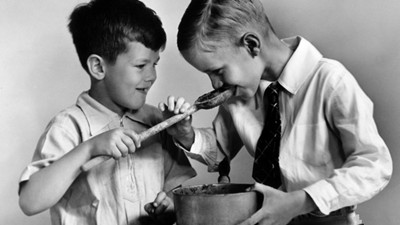食物
The saucier's apprentices
烹饪学徒
Humanity's relationship with cookery is unique—and shouldn't be lost By Michael Pollan.
生活与烹饪的独特关系—不应被舍弃
Cooked: A Natural History of Transformation.
烹饪,转变的自然史
BEFORE Michael Pollan came along, eating as a form of politics was a fringe activity. Dubbed the “liberal foodie intellectual” by the New York Times, the American activist and author has spent the last two decades writing bestselling books, such as “In Defence of Food”and “The Omnivore's Dilemma”, in an effort to popularise cooking and highlight the defects of the food industry and the rich world's bad eating habits.
在Michael Pollan的书火了之前,设饭局已不流行。这位被《纽约时代》称为饕餮知识分子的美国作家兼活动家,花了20年写就了多本畅销书,像是《为食物辩护》和《杂食动物的困境》,他大力推广烹饪,针砭时弊食品工业和发达国家糟糕的饮食习惯。

Mr Pollan's latest book, “Cooked”, is divided into four sections: fire, water, air and earth. Although something of an authorly conceit, these divisions allow him to explore a range of culinary topics from the joy of making soufflés that rise to why bacteria are needed in fermentation. He also returns to a conundrum he has previously described as the “cooking paradox”: why it is that people now spend less time preparing food from scratch and more time reading about cooking or watching cookery programmes on television.
他的新书《烹饪》分为四个部分:火,水,空气和土。虽然这样分,显得有些自负,不过在每个部分,作者都有关于烹饪的心得,比如从制作起酥的乐趣到为什么发酵中需要细菌。书中同样也探讨了他之前谈到的“烹饪的悖论”—为什么人们花更少的时间下厨,花更多的时间读烹饪书籍或是看电视烹饪节目?
Mr Pollan explores the same way a naturalist might, by studying the animals, plants and microbes involved in cooking, and delving into history, culture and chemistry. With help from experts he masters the “whole hog” barbecue, a loaf of bread and the cooking pot. He describes the remarkable transformations that take place in the humble saucepan, where fibres are broken down, seeds softened and rendered edible, plants detoxified, and flavours brought together from far-flung taxonomic kingdoms.
作者研究烹饪中的动物,植物和微生物,钻研历史,文化和化学,就像个博物学者一样。在行家的帮助下,他掌握了如何制作烤猪,长条面包,使用锅子。他描述了发生在炖锅中的奇妙转变,锅中食物的纤维被破坏,种子被煮软,变得可以食用,植物食材的去毒以及多种不同时才一起烹饪带来的奇妙味道。
Side by side with Mr Pollan the naturalist is the author as activist. Although the fruit and vegetable areas of supermarkets have grown ever bigger over the past two decades, cooking has expanded to take in heating up a tin of soup, microwaving ready-meals and frozen pizzas or breaking open a bag of mixed lettuce leaves. Mr Pollan places great emphasis on the work of Harry Balzer, an expert on food, diet and eating patterns in America. Collecting data from thousands of food diaries, Mr Balzer concludes that, since the 1980s, fewer and fewer people have been cooking their evening meal.
Michael Pollan是博物学家,也是作家和活动家。虽然超市水果和蔬菜的区域在过去的20年不断扩大,可是烹饪却越来越不被当回事,连加热罐头汤,微波即时食品或冷冻披萨,打开袋装莴苣叶都算烹饪。Harry Balzer 是研究美国人的食物,膳食和饮食习惯的专家,Pollen非常重视Harry的研究。Harry从几千份饮食日记中获得信息并得出结论,他认为,自从20世纪80年代以来,越来越少的人在家做晚餐。
Mr Pollan is keen for this trend to be reversed and his book is a hymn to why people should be enticed back into the kitchen. Cooking, he believes, creates bonds between humans and the web of living creatures that sustain and nourish them. Turning away from this means that foods that are tasty and healthy (as bread once was) are being taken off the menu with far-reaching consequences. Industrially produced food almost always trades in quality ingredients for higher amounts of sugar, salt and fat—with a corresponding rise in levels of obesity.
Pollen致力于扭转这样的趋势,他的书写的就是为什么人们应该自己烹饪。他坚信,烹饪联系了人类和其他被食用的生物。不赞成这一观点就意味着不认为健康美味的食物从菜单上取消会带来深远的影响。通常,工业生产的食物会选用高糖高盐高脂肪而非高品质的食材,这就导致肥胖人数增加。
Before refrigeration, bad food often killed people. Bacteria, such as E. coli, occasionally still do. In recent decades a great deal of research has been done on the array of good microbes humans carry within them and which they need in order to stay healthy. “Cooked” is particularly informative about the rapidly moving scientific frontier of microbial ecology and how, in a post-Pasteurian world, the live-culture foods which used to make up a large part of the human diet are good for people and for the microbes that live inside the gut.
在冷藏技术出现之前,败坏的食物通常是致命的。细菌,比如大肠杆菌,偶尔也会置人于死地。近几十年内有许多关于人体自身携带的益生菌和哪些益生菌能使人健康的研究。《烹饪》中介绍了许多关于微生物生态学的最前沿研究,以及在巴氏消毒法出现之前,那些人类饮食中大部分被食用的含有微生物的食物对人体和体内益生菌有什么益处。
The book dwells on fermented foods, for example. These have largely vanished from supermarkets but many cultures have developed such specialities, including Malaysian tempoyak, (fermented durian fruit), Russian kefir and Mexican pozole. Even bread, cheese and chocolate all depend on harnessing the power of microbes. These invisible forces travel alongside humans, Mr Pollan says, in a “dance of biocultural symbiosis”, cleverly transforming, sterilising or even adding nutrients.
《烹饪》详细介绍了发酵食物。超市已经很少售卖这类食物,但是在一些国家,发酵食物已成为特色菜,比如马拉西亚的榴莲糕,俄罗斯的一种类似酸奶的可佛酒,莫斯哥的pozole。就连面包,芝士和巧克力的制作都需要微生物的力量。Pollen称,这种隐形的力量就存在于人体内,是种奇妙的生物共生,转变,灭菌或是制造营养物质。
Mr Pollan recognises that cooking today is very different from what it was in his grandmother's time, and that decades from now even a limited desire to cook may be seen as quaint. This would be a shame. Real cooking allows people to create, to put their own values into food, to escape the industrialised eating that has created health crises all over the world. Cooking is part of being human. The alternative is to evolve into passive consumers of standardised commodities that promise more than they deliver. Best of all, argues Mr Pollan, cooking makes people happy.
Pollen认为,今天的烹饪和他外婆时代的烹饪是不同的。几十年后,随便煮煮饭都被认为是件新奇有趣的事。现在的趋势真让人惋惜。真正的烹饪(而非简单的加热)是创造的过程,是加入自己的想法,是摆脱带来世界健康危机的工业生产的食物。烹饪是生活的一部分。最重要的是,烹饪使人快乐。不烹饪就是选择成为标准化生产食物的被动消费者,这些食物通常没有广告中说的那么好。













